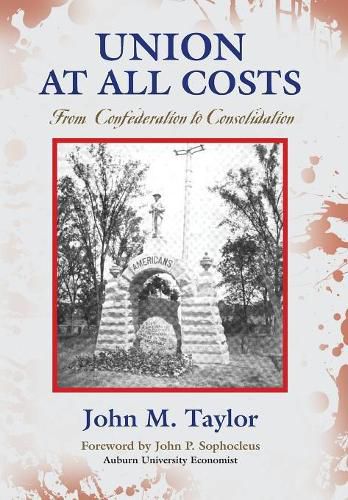Readings Newsletter
Become a Readings Member to make your shopping experience even easier.
Sign in or sign up for free!
You’re not far away from qualifying for FREE standard shipping within Australia
You’ve qualified for FREE standard shipping within Australia
The cart is loading…






This title is printed to order. This book may have been self-published. If so, we cannot guarantee the quality of the content. In the main most books will have gone through the editing process however some may not. We therefore suggest that you be aware of this before ordering this book. If in doubt check either the author or publisher’s details as we are unable to accept any returns unless they are faulty. Please contact us if you have any questions.
Is the Union voluntary or an agreement with no escape route? Setting the tone, John M. Taylor leads off by noting the travails of a respected ancestor. Major questions in America are explored, including differing views of the meaning of union. Though numerous issues led to war, most modern establishment historians generalize everything down to one. Pre-war and post-war years are largely ignored, trivialized, or sanitized.
The four-year travesty of 1861-65 represents the most destructive period in American history and a change in the republic itself. The conflict-the agricultural South versus the North, where agriculture was important, but corporate, banking, and industrial interests swung the most weight. Jeffersonian States’ Rights meets Hamiltonian Nationalism.
Modern portrayals of Lincoln perpetuate the winner’s narrative; facts that fall outside the politically correct script are cast asunder. A power-seeking individual such as Lincoln was required to transform a voluntary confederation into a top-heavy centralized government. Protectionist Whigs and other big government advocates created the centralizing vehicle-the Republican Party-to accomplish their goals. In 1860, they selected Abraham Lincoln to implement the agenda. Taylor shows how Lincoln and the Radical Republicans planted the seeds of leviathan we witness today.
$9.00 standard shipping within Australia
FREE standard shipping within Australia for orders over $100.00
Express & International shipping calculated at checkout
This title is printed to order. This book may have been self-published. If so, we cannot guarantee the quality of the content. In the main most books will have gone through the editing process however some may not. We therefore suggest that you be aware of this before ordering this book. If in doubt check either the author or publisher’s details as we are unable to accept any returns unless they are faulty. Please contact us if you have any questions.
Is the Union voluntary or an agreement with no escape route? Setting the tone, John M. Taylor leads off by noting the travails of a respected ancestor. Major questions in America are explored, including differing views of the meaning of union. Though numerous issues led to war, most modern establishment historians generalize everything down to one. Pre-war and post-war years are largely ignored, trivialized, or sanitized.
The four-year travesty of 1861-65 represents the most destructive period in American history and a change in the republic itself. The conflict-the agricultural South versus the North, where agriculture was important, but corporate, banking, and industrial interests swung the most weight. Jeffersonian States’ Rights meets Hamiltonian Nationalism.
Modern portrayals of Lincoln perpetuate the winner’s narrative; facts that fall outside the politically correct script are cast asunder. A power-seeking individual such as Lincoln was required to transform a voluntary confederation into a top-heavy centralized government. Protectionist Whigs and other big government advocates created the centralizing vehicle-the Republican Party-to accomplish their goals. In 1860, they selected Abraham Lincoln to implement the agenda. Taylor shows how Lincoln and the Radical Republicans planted the seeds of leviathan we witness today.